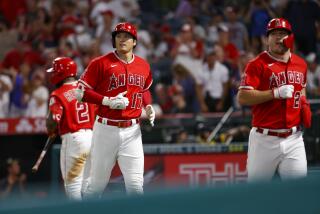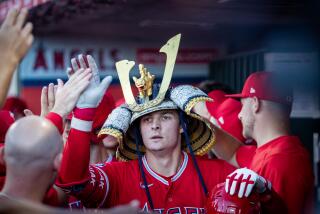Joyner Takes Collar, Blame as Angels Lose
- Share via
The only request made of Wally Joyner when he broke in with the Angels in 1986 was to replace Rod Carew. Nowhere in the fine print did it say he also had to become Rod Carew.
But here it is, 60 games into the 1988 baseball season, and the Angels once again have a first baseman who hits for a decent average and no power, who specializes in the one-base hit, who drives in runs usually by accident and seldom in pressure situations.
After watching Joyner total 56 home runs and 217 RBIs in his first two major league seasons, the Angels have come to expect more than this. And in Saturday’s 7-0 Angel loss to the Kansas City Royals, the continued absence of run production from Joyner finally grew conspicuous enough to draw criticism from Manager Cookie Rojas.
“Wally’s hitting .280, but it’s not a productive .280,” Rojas told reporters after the two-hitter that the Kansas City Royals’ Mark Gubicza threw at Joyner and the Angels before a crowd of 30,355 at Anaheim Stadium.
“We haven’t had the real good, consistent offense this year . . . and Wally has to accept some part of that. How many home runs does he have this year? Two? How many did he have this time last year? Fifteen? That’s quite a difference.
“He hasn’t been able to do it, and we need his bat to definitely get going. He’s the most productive hitter this team had the past two years.”
Last year, en route to a 34-home run, 117-RBI season, Joyner was batting .277 with 12 home runs and 44 RBIs after the Angels’ first 60 games. At the same stage in 1988, Joyner is again batting .277--but with only 2 home runs and 21 RBIs.
To put those numbers in a different perspective, that’s five fewer home runs and eight fewer RBIs than Royal shortstop Kurt Stillwell, who went 4 for 4 with two doubles and a home run Saturday.
Joyner went 0 for 4 against Gubicza (8-5), helping the Kansas City pitcher record his first career two-hitter, and afterward pleaded no contest to Rojas’ contentions.
“He’s right,” Joyner said. “I’m hitting a real easy .280. I’m aware of that more than anybody. I guess I’m the guy who’s the least satisfied with what’s going on with Wally Joyner.”
Several theories have been forwarded regarding Joyner’s sudden power shortage. One concerns the spring contract dispute Joyner waged with Angel General Manager Mike Port, allegedly prompting him to press at the plate in order to compile statistics bound to impress a salary arbitrator in 1989. Another, espoused by Rojas, concerns the lack of support presently surrounding Joyner in the Angels’ woeful batting order.
“One thing has changed here,” Rojas said. “When Joyner had those two big years, guys like Reggie Jackson, Doug DeCinces and Bobby Grich were hitting behind him. We don’t have that kind of club now, and he’s not seeing the same kind of pitches. They’re not giving him many good pitches to hit.”
Joyner took a cut at both theories.
On the fallout from this spring: “I can only worry about what happens today. I learned a couple years ago in triple-A that if you play hard and work hard, by the end of the year you’re going to have decent numbers.
“If, in fact, I end up having a bad year, all it means is I’ve had a bad year. It doesn’t mean I can’t play. I’ve promised myself I’m not going to give up. I’m going to sweat and get blisters on my hands from trying, so I won’t have any excuses.”
On the poor pitch selection he’s supposedly seeing: “Today I got my fastballs to hit and my hanging sliders to hit. I just missed them. I got myself out--and that’s what you never want to do.”
Joyner hit his last home run nearly six weeks ago, May 1 against the Toronto Blue Jays. In 1986, Joyner hit 16 home runs in six weeks. In both 1986 and 1987, he had 20 home runs by the All-Star break.
Those are the type of memories contributing to his current set of mind games.
“That maybe makes it more frustrating--knowing I’ve done it before and it’s not happening,” he said. “I’m not a (natural) home run hitter, but I’m the kind of hitter who takes advantage of pitchers’ mistakes. Right now, though, I’m not taking advantage of anything, because I don’t have a good approach.”
In that category, Joyner had company Saturday. Only two Angels, Chili Davis and Darrell Miller, managed hits against Gubicza--and Miller’s never left the infield. Nine Angels struck out against Gubicza and no Angel advanced beyond first base until the ninth inning.
Still, Joyner wound up as the postgame focus in the Angel clubhouse, which, he claimed, came as no surprise.
“Granted, we’re not playing good as a ballclub,” he said, “but when that happens, it magnifies a lot of people’s seasons. . . .
“I can continue the whole season doing what I’m doing now. I can put the bat on the ball, I can make contact and hit it through the infield. But I’m not attacking the ball--and that’s what I have to do. I’ve got to drive the ball and score some runs for this team.”
Until Joyner can begin doing that on a regular basis, the Angels can expect outcomes like Saturday’s on a regular basis.
Angel Notes
Angel starter Kirk McCaskill (2-5), allowed 4 runs on 8 hits in 6 innings. The main damage was done in the second inning, when McCaskill yielded four straight hits--three singles and a double by Willie Wilson--and the Royals parlayed them into a 2-0 lead. “McCaskill didn’t throw that badly,” Angel Manager Cookie Rojas said. “The four hits in one inning hurt him, and he tired in the seventh. But, again, there’s not much you can do when you only get two hits.” . . . Mark Gubicza’s two-hitter was the third thrown against the Angels this season. Saturday’s game also marked the 10th time the Angels have been held to five hits or less this season. In three of their last four games, the Angels have scored one run or less, but because of 1-0 victories by Mike Witt and Dan Petry, the Angels are 2-1 in those games. . . . Brian Downing, on Gubicza: “He was definitely on today. He threw great, judging from the few pitches I saw. It wouldn’t have mattered if we had our ’79 or ’82 (division-winning) teams out there against him. The way he threw, he’d have have beaten us anyway.” . . . Injury update: Gus Polidor had his sore rib cage injected with cortisone before Saturday’s game. “Now, we want to see how it responds,” Angel team physician Dr. Lewis Yocum said. “We’ll rest him the rest of the home stand and see how it is in five or six days.” Mark McLemore could be back on the active roster before that, according to Yocum. Yocum calls McLemore’s arm ailment--a case of phlebitis, or inflammation of the vein--”the ultimate day-to-day injury. He says it’s feeling better. Maybe he’ll be ready by the first of next week.”
More to Read
Go beyond the scoreboard
Get the latest on L.A.'s teams in the daily Sports Report newsletter.
You may occasionally receive promotional content from the Los Angeles Times.






